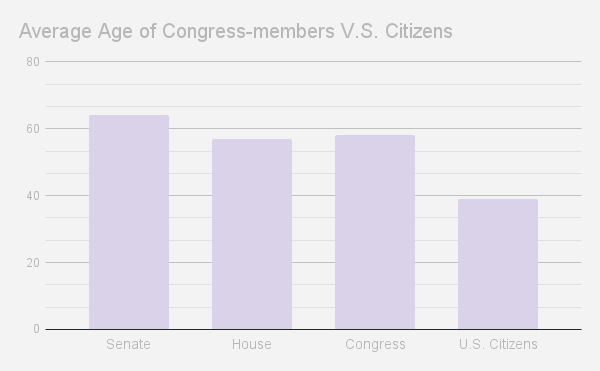I knew U.S. politics were doomed when Mitch McConnell froze during a press conference for almost a whole minute, and then the news disappeared within the next press cycle.
With a generation that includes 80-year-old presidential candidates and a Senate whose average age is 65.3-years-old, according to the Pew Research Center, politicians are slowly drifting further and further away demographically from the group they’re supposed to be representing: the average Americans. This is why the current generation of politicians needs to retire and pass the torch to officials who actually represent us.
Between 2021 and 2022, the The United States Census Bureau estimated the age of the average American to be 38.9-years-old, a number that is far from the Senate’s average of 65.3-years-old. Only one senator is below the median American age: 36-year-old Georgia Sen. John Ossoff.
It’s widely believed that as you get older you become wiser, however at a certain point, we have to acknowledge the declining cognitive functions of senior citizens. Take Mitch McConnell’s thousand-yard-stare for example.
Besides failing to represent the average American, politicians also face many issues associated with old age, such as catastrophic falls and declining mental ability.
With old age comes memory loss and weakened decision making skills. According to Columbia University’s “the 2016 Health and Retirement Study Harmonized Cognitive Assessment Protocol Project,” 1 in 10 U.S. adults over 65-years-old have dementia. While these conditions are nothing to be ashamed of, the concern is that many of our politicians fall into this age group, making them less fit to make political decisions.
For example, 80-year-old President Joe Biden has faced several falls, some of them quite worrisome, in his past political term. While none of these falls have put Biden in the hospital, similarly aged senate Republican leader Mitch McConnell had a fall in March that put him into the hospital with a concussion and a rib fracture. McConnell had to spend almost six weeks out of the office. The last thing we need right now is crucial political leaders out in hospitals rather than in their Senate seats.
Even worse than a temporary leave from office is a death in the middle of their term. On Sept. 28, Dianne Feinstein passed away at the age of 90-years-old. When she died, she was still an incumbent member of the California Senate. Feinstein served for 31 years, taking up a position that could’ve been filled with a younger, more representative and more capable politician. In her last year, many colleagues encouraged her to step down and anonymously reported her showing signs of memory lapses. Yet she ignored these concerns, saying she would not retire.
The examples are becoming increasingly evident. Our politicians are just getting too old to represent Americans. These politicians are making laws based on how they grew uo and what they experienced, which couldn’t be further from what people are dealing with now.
Americans don’t want more money in the defense fund, we want debt relief and help with the housing market. The buying power of a dollar whenever our current politicians were growing up is significantly more than it is now, meaning they didn’t have to worry about paying for college as it was not yet affected by inflation. Things like minimum wage are being voted upon by people who would’ve started their first job in the ‘60s or ‘70s.
The minimum wage in 1977 was $2.30 an hour, whereas it’s now $7.25 an hour in Texas. It would take 1,174 hours of minimum wage work to pay off a year of private college in 1977. Now it would take 4,520 hours of minimum wage work.
We can no longer set aside the fact that many of our politicians grew up in a completely different economic environment than we are currently living in, yet still ignore the realities of the modern day.
What we need now is younger generations running for office and being welcomed by the older generations, as opposed to older generations feeling threatened by a more representative, healthier and younger presence in office. We as the younger generation need to unite to elect politicians that represent us instead of electing the same older ones who simply have a larger following due to their decades of service.
These upcoming years, more than ever, the younger generations need to look into ensuring that their future is protected by electing representative politicians.




